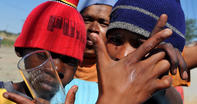Children with the Odds Stacked Against Them
Every child born into the kind of poverty seen in Malaykamp in the Northern Cape – not just economic poverty, but a paucity of knowledge and nutritional literacy and nutrition itself – which leaves children inadequately fed and nourished, sows the seeds for an entire generation of adults who are less likely to become productive, skilled, contributing members of society and the economy.

But this is not just about valuing a person in terms of their rands-and-cents contribution to the labour pool. Consider the personal well-being that comes with someone being able to take care of herself and her family when she is in a good job and earning a decent wage.
But how much worse for children who find themselves, through the random accident of birth, not just pushing out their first shoots in a state of undernourishment but also finding themselves thrown into a set of circumstances where the roles of ‘normal’ behaviour enacted for them daily involve binge drinking, brawling and blowing social grant money down at the local bottle store?
How much worse for those who not only start out so poorly nourished that they are saddled with a degree of mental underdevelopment for the rest of their lives, but are exposed to other toxins, such as alcohol, while still in the womb?
Children born into these circumstances have the odds stacked against them from the very moment of conception. For many of the children of Malaykamp, the die is cast a long time before they are old enough to walk to the nearest soup kitchen.
Damage at a Genetic Level
We have known for some 40 years already that drinking alcohol during pregnancy can damage an unborn child at a genetic level.
The consequences, particularly of drinking during the first two trimesters, can be a range of physical and mental disabilities that inhibit the child’s learning and speech later in life, can produce delayed social and motor skills, impair memory and create attention deficits, writes Alicestine October in the Bulletin of the World Health Organization.
Children who are exposed to alcohol as a toxin in the womb may show any number of these problems – all incurable – which fall within the spectrum of foetal alcohol disorders. The most severe of these is Foetal Alcohol Syndrome (FAS). In a study of four South African cities in 2002 and 2003, the number of full or partial FAS in children entering the schooling system was dramatic.
In Jo’burg, nearly 3% of children showed signs of FAS. Uppington had nearly 7% FAS-affected children and Wellington had nearly 9%. But in De Aar, 120 out of every 1 000 children starting school showed some sign of being touched by FAS. That is 12%. In high-income countries, the average is about 0.1% FAS cases.
FAS in South Africa
These figures are mind-blowing, according to retired Professor Denis Viljoen, chairman of the Foundation for Alcohol Related Research and director of the Centre for Genetic Research and Education at Stellenbosch University. ‘Nearly one in ten pupils had partial or full FAS, and the rate for De Aar is the highest yet described in South Africa,’ says Viljoen.
All the signs of malnutrition were there, too. A parallel study of children starting out at eight De Aar and twelve Uppington schools, between 2001 and 2004, found two thirds of the children were underweight, nearly half were stunted and 15% had a below-average head circumference. Of these children screened, nearly 7% had full-blown FAS.
Obviously, if a mother drinks heavily during those first two trimesters, she is going to put her baby at risk. But if she is not getting enough of the right foods either, there is even more chance that the alcohol she does drink will work its folly on her growing baby. This is where one of the most devastating effects of alcohol in pregnancy shows itself, in terms of its direct link to poverty and malnutrition, says Viljoen.
‘If you look at cycle drinking during pregnancy and its effects on the foetus, you’ll find that the poorest of the poor are the ones who produce the children that are most devastated by alcohol abuse during pregnancy. You get more severe effects, more frequent effects on the foetus and you get more alcohol abuse amongst those women. The kind of chronic malnutrition which leads to small head and brain size in kids starts with maternal malnutrition. It’s not initiated with the baby.’
By Leonie Joubert